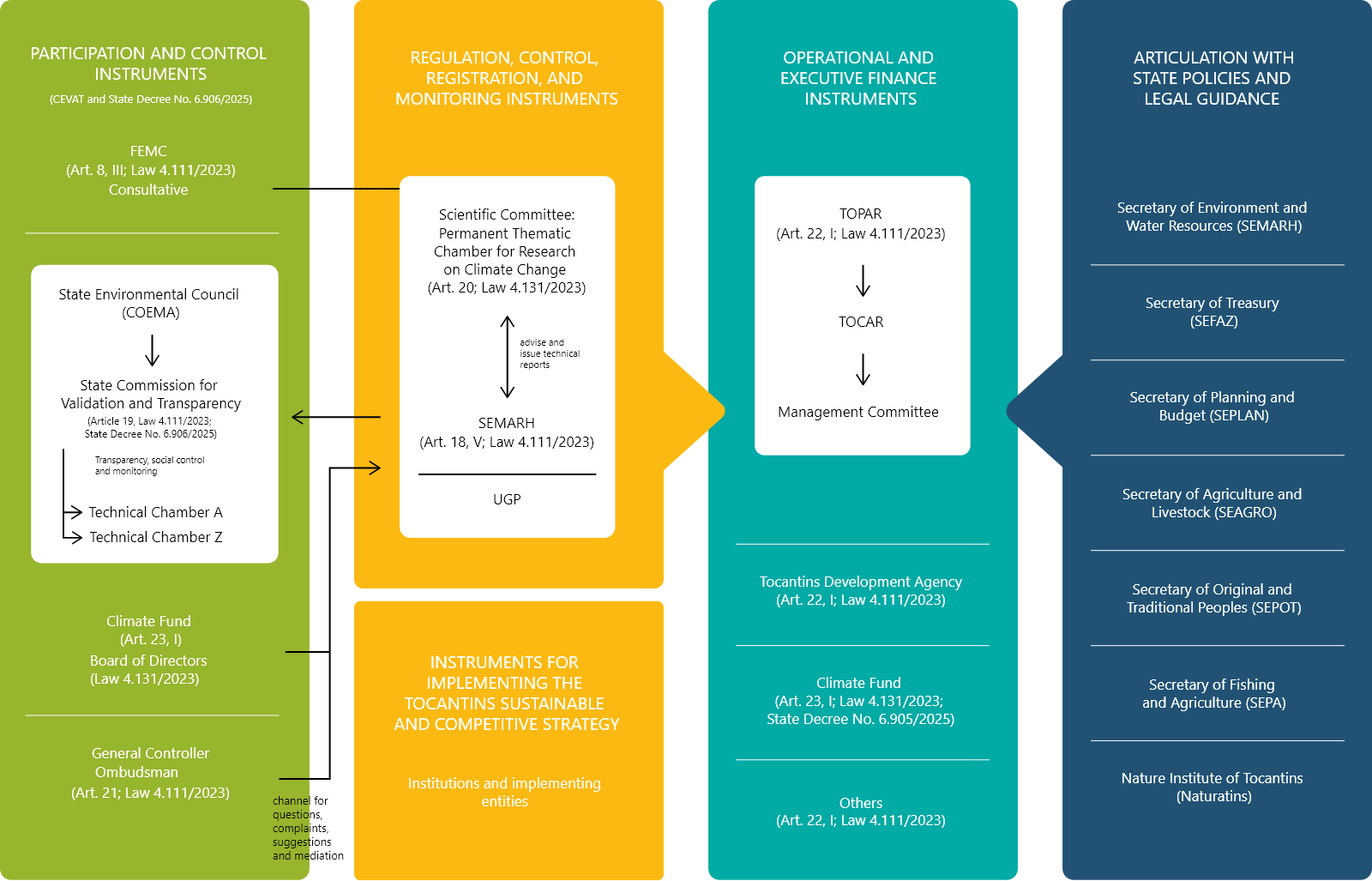The governance structure designed for the REDD+ Jurisdictional Program is formed by governmental and non-governmental entities from diverse spaces and levels of deliberation and decision-making, in order to enable compliance with Cancún’s socio-environmental safeguards.
Considering that the REDD+ Jurisdictional Program is part of the State Policy for Payment for Environmental Services (PEPSA) of Tocantins, the governance structure composed of instruments created by Law No. 4111/2023 and other supplementary regulations apply to the program.
In this framework, state agencies have primary responsibility for the implementation, validation, monitoring and supervision of public policies and activities that constitute the program’s REDD+ strategy. On the other hand, there are also a series of instruments to ensure respect for the rights of indigenous peoples, quilombolas, traditional peoples and communities, and family farmers (PIQPCTAFs), as well as small, medium and large rural producers, promoting social participation in the design and implementation of the program.

The governing body of the State Policy for Payment for Environmental Services and the JREDD+ Program. It is the government entity responsible for implementing the State’s environmental policies. It leads the planning and management of the Program’s emissions reduction actions and monitors compliance with socio-environmental safeguards.
Mixed economy company that aims to promote the economic and social development of Tocantins. Entity authorized by the PEPSA Law to transact jurisdictional carbon credits in Tocantins
A higher, consultative, normative and deliberative body, linked to SEMARH, which guides the design and implementation of the Jurisdictional Program. It has the participation of state secretariats, municipal and federal institutions, control bodies, associations representing economic sectors, indigenous peoples, family farmers and the scientific community
Multi-sector consultative forum where information on the design and implementation of the Jurisdictional Program is disseminated and debated, with broad involvement of the Public Authorities, civil society, the private sector, the academic community and the media.
Consultative and deliberative body provided for by the PEPSA Law and established by State Decree No. 6.906/2025, with the participation of organized civil society and public authorities. Linked to COEMA, its role is to ensure transparency and social control of the Program, as well as to validate and monitor its implementation
A private-sector Special Purpose Entity (SPE) with the participation of the State of Tocantins. The SPE was created within the scope of the business opportunity designed by Tocantins Parcerias (article 28, §3, item II and §4 of Law No. 13.303/2016), with the objective of structuring the Jurisdictional REDD+ Program and supporting the generation of carbon credits.
Its purpose is to guide the design and implementation of the Program to maintain the technical rigor of the methodological aspects related to the measurement, quantification and estimates of the State’s emission reductions, providing a firm scientific basis for REDD+ actions and other climate-related initiatives.
Established within the scope of the Cartography Commission of the State of Tocantins, with the task of evaluating the technical quality of the data used to quantify emission reductions from deforestation and forest degradation in Tocantins.
Responsible for ensuring compliance with the Cancun Safeguards for all stakeholders within the Tocantins REDD+ Jurisdictional Program, including guiding the consultation and benefit sharing process of the program. It has three Sectoral Chambers (each composed of representatives of state and federal agencies and organizations representing different social groups): CS Safeguards for Indigenous Peoples, CS Safeguards for Quilombolas and Traditional Populations, and CS Safeguards for Family Farming.
Body provided by State Law No. 4.131/2023 and established by Decree No. 6.905/2025. The Council will be composed of 13 members: seven from the public sector and six from organized civil society, including representatives of PIQPCTAFs, academia, and the private sector. It is responsible for defining the strategic direction of the Fund, ensuring that the financial resources from the sale of jurisdictional credits are allocated effectively to projects that meet the Program’s priorities and objectives.
Responsible for supervising the execution of laws and compliance with anti-corruption practices during the implementation of the Program, and for controlling the use of public resources, including those allocated to state REDD+ actions and state entities involved in the implementation of the Program’s actions.